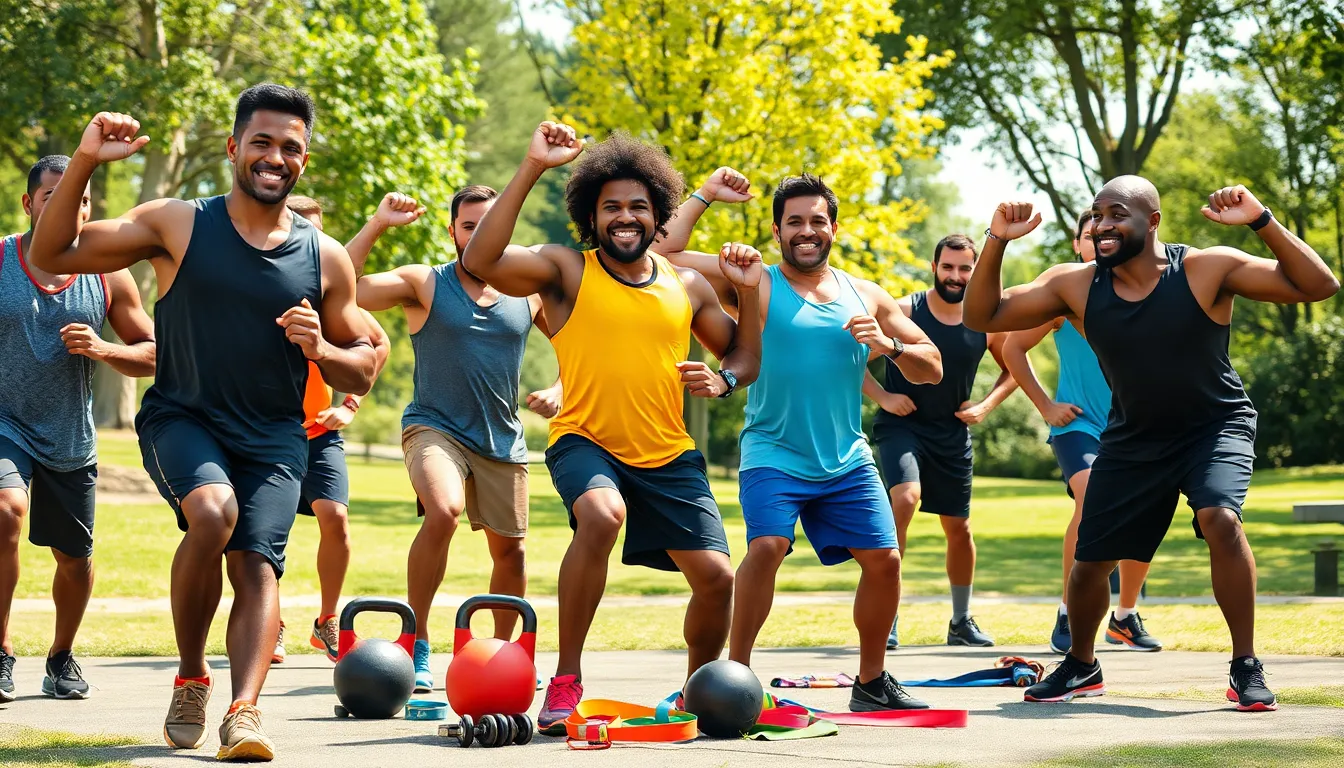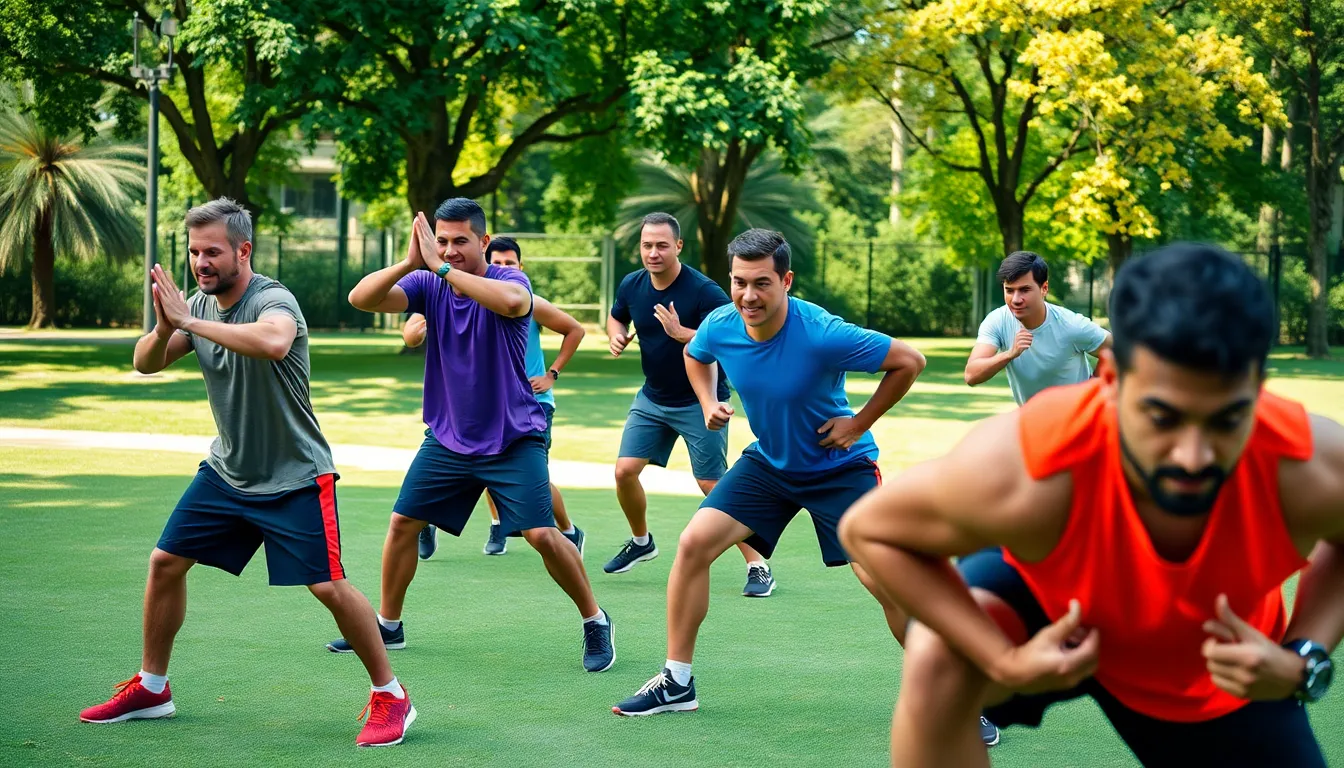As society evolves, so do the conversations around men’s health. Today, men are more aware than ever of the importance of physical and mental well-being. This shift has sparked new trends that prioritize holistic health, encouraging men to embrace fitness, nutrition, and mental wellness like never before.
From the rise of functional fitness to the growing acceptance of mental health discussions, these trends reflect a significant cultural change. Men are increasingly seeking solutions that not only enhance their physical performance but also support emotional resilience. Understanding these trends is crucial for anyone looking to navigate the modern landscape of men’s health effectively.
Table of Contents
ToggleOverview of Men’s Health Trends
Men’s health trends show a notable shift towards comprehensive well-being, emphasizing both physical fitness and mental health. Recent studies indicate that 78% of men report a growing interest in functional fitness, focusing on exercises that enhance everyday activities. This trend reflects an understanding of fitness beyond aesthetics, prioritizing strength, flexibility, and endurance.
Mental health awareness among men has surged, with 60% of men acknowledging the need for mental health support. This change promotes conversations around stress management, anxiety, and depression. Men’s support groups and mental health apps have gained popularity, contributing to this paradigm shift.
Dietary habits also evolved, with plant-based diets gaining traction. Research shows a 30% increase in men adopting vegetarian or vegan diets, driven by health concerns and environmental awareness. This trend prioritizes nutrient-dense foods and minimizes processed ingredients.
Additionally, men’s grooming and self-care have gained prominence, with 45% of men investing more in personal grooming products over the past three years. Skincare routines and general wellness products reflect a broader cultural acceptance of self-care.
Overall, these trends signify a holistic approach to men’s health, integrating physical fitness, mental resilience, nutrition, and personal care into daily routines. Understanding these aspects is crucial for addressing the diverse health needs of men today.
Physical Health Trends


Physical health trends among men have evolved significantly, reflecting a shift towards comprehensive wellness. Key areas include exercise and fitness regimens, as well as dietary approaches.
Exercise and Fitness Regimens
Exercise regimens emphasize functional fitness, which focuses on building strength and endurance for daily activities. According to recent surveys, 78% of men prioritize functional fitness in their workouts. Popular activities include resistance training, HIIT (High-Intensity Interval Training), and bodyweight exercises, known for enhancing overall physical performance. Many men also participate in group fitness classes, fostering community engagement and motivation. Additionally, outdoor activities such as hiking, cycling, and running gain popularity, promoting both physical and mental health.
Dietary Approaches
Dietary habits among men are increasingly plant-based, with a reported 30% more men adopting vegetarian or vegan diets. This shift results from growing awareness of health benefits associated with reduced meat consumption, including lower risks of chronic diseases. Men prioritize whole foods, including fruits, vegetables, nuts, and grains, over processed products. Nutrition education also plays a critical role, with many men seeking guidance on meal planning, portion control, and nutrient balance. Increasingly, men incorporate supplements, such as protein powders and vitamins, to optimize their diets and support fitness goals.
Mental Health Trends
Men’s mental health receives increasing attention, reflecting a broader societal shift towards recognizing the importance of psychological well-being. With fewer stigmas, discussions about mental health grow more common among men.
Awareness and Attitudes
In recent years, mental health awareness among men has intensified. Research shows that about 60% of men recognize their need for mental health support, as conversations about issues like anxiety and depression become more mainstream. This shift encourages men to seek assistance and promotes the idea that prioritizing mental well-being is essential for overall health. Support groups and therapy are becoming more acceptable, contributing to a cultural environment that values emotional expression and vulnerability.
Impact of Social Media
Social media plays a significant role in shaping men’s attitudes toward mental health. Platforms such as Instagram and Twitter facilitate open dialogues about mental health issues, allowing men to share experiences and connect with others facing similar challenges. Content creators often promote mental health awareness and provide resources, which can empower men to reach out for help and practice self-care. Engagement in these online spaces fosters community, reduces feelings of isolation, and encourages men to advocate for their mental well-being.
Preventive Care Trends
Preventive care is gaining momentum in men’s health, emphasizing proactive measures to identify and address health issues early. Regular screenings and health technology integration play crucial roles in shaping these trends.
Regular Screenings and Check-ups
Regular screenings and check-ups are essential in detecting health conditions early. Statistics show that men are increasingly participating in preventive health measures. In 2023, approximately 70% of men aged 40 and older scheduled annual check-ups, up from 55% in 2020. Recommended screenings often include prostate exams, cholesterol tests, and blood pressure measurements to monitor long-term health. Additionally, awareness of the importance of mental health screenings has risen, with 65% of men now prioritizing psychological evaluations during routine visits.
Health Technology Integration
Health technology integration is transforming preventive care in male health management. Wearable devices that monitor heart rate, physical activity, and sleep patterns are helping men take charge of their wellness. Data shows 45% of men use fitness trackers or smartwatches as part of their health regimen. Telehealth services are also on the rise, with a 50% increase in remote consultations since 2020, enabling men to access healthcare professionals without the barriers of physical visits. Apps that provide dietary advice, exercise tips, and mental health resources further support this trend, promoting engagement and empowerment in maintaining health.
Lifestyle Trends
Men’s health trends increasingly reflect a focus on balanced living and responsible choices. Awareness of lifestyle factors that impact health continues to rise, influencing various aspects of daily life.
Work-Life Balance
Work-life balance is becoming a priority for many men, as evidenced by studies showing that 72% of men seek strategies to maintain this balance. Flexible work arrangements and remote work options allow for healthier daily routines, reducing stress and increasing productivity. Time management techniques, such as setting boundaries and prioritizing self-care, contribute to improved mental health. Engaging in leisure activities or spending quality time with family supports fulfilling personal lives and strengthens relationships.
Substance Use and Abuse
Substance use trends also reflect changing attitudes among men. Reports indicate that alcohol consumption among men has decreased by 14% since 2020, as more individuals seek healthier alternatives. The rise of mindfulness practices plays a role, encouraging a focus on well-being over substance reliance. Substance abuse discussions emphasize the importance of support networks, with 58% of men expressing a willingness to engage in conversations about addiction. Programs addressing substance use through education and community support foster healthier lifestyles and resilience.
The landscape of men’s health is undergoing a significant transformation. Men are embracing a more holistic approach that prioritizes both physical and mental well-being. This shift reflects a growing awareness of the need for balance in fitness, nutrition, and emotional health.
As trends evolve men are increasingly engaging in open discussions about mental health and adopting healthier lifestyles. The rise in preventive care practices and the integration of technology into health management further underscore this commitment.
Ultimately these developments indicate a promising future where men prioritize their overall health and well-being, fostering a culture that values comprehensive self-care.



